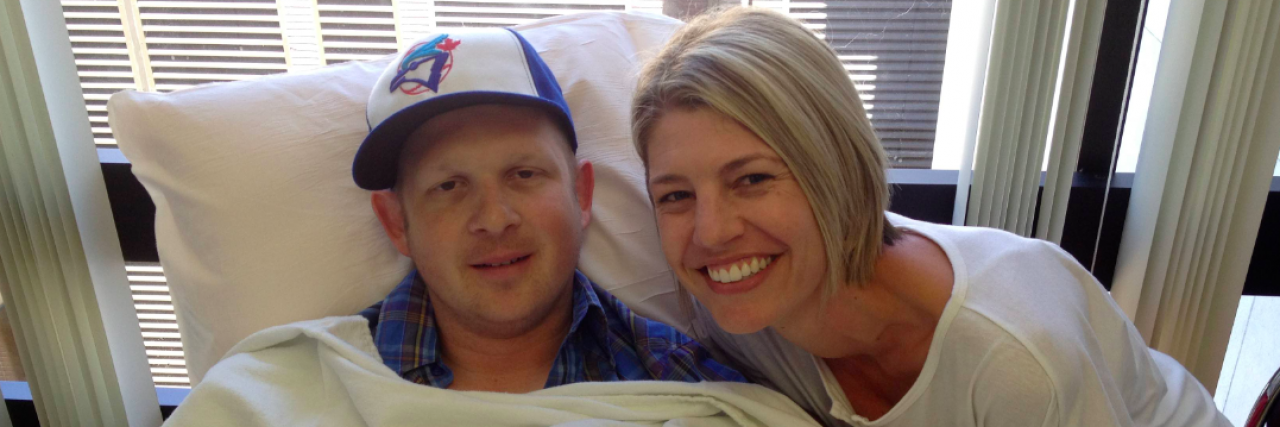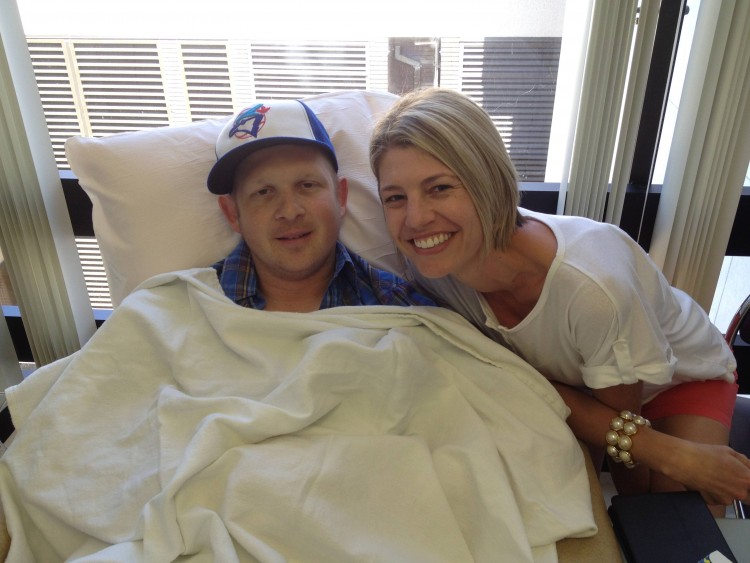One time, a few years ago, someone I loved had cancer.
He caught it the way most people do, unexpectedly and without warning. Just months before his diagnosis, I’d been the one in a hospital gown. He faithfully attended my prenatal appointments and then held my hand while I pushed a seven-pound baby into the world, changing our lives forever. Little did we know it would be one of two life-changing moments over the course of three months, because suddenly the roles reversed. Now cancer was growing in our house instead of my growing belly. He’d officially become a cancer patient, and I’d officially become the person at his side. The person they call wife but also caregiver; the person who could become a widow if everyone isn’t careful.
It’s hard these days to talk about his cancer. With time, you’d think it would become easier, but I’m finding the opposite to be true.
There’s this thing called survivor’s guilt — maybe you’ve heard of it? Survivor’s guilt is a mental condition where someone feels bad because they’ve survived a traumatic event when others did not. Survivor’s guilt can take on a lot of different forms, and people can feel it after walking away from a deadly car crash, making it home after war or even in something as simple as keeping your job during company wide layoffs.
My husband, Jonathan, had stage IV cancer, but even he experiences survivor’s guilt. I remember leaving chemotherapy with him one Friday, and he commented that he shouldn’t complain because his cancer was so treatable, and he was young.
A few months later I bought him a bold yellow shirt that said “survivor” across the front. He wore it once to please me and never put it on again. “Survivor,” in his mind, is nothing to tell the world about. He didn’t do anything to claim survivor status; his body just had a treatable cancer that happened to respond to drugs. He’d rather wear his Seattle Seahawks shirt than call any more attention to himself. His bald head and missing eyebrows had been enough of a conversation starter.
I feel guilty a lot these days, too. When I talk or write about cancer, I tell myself I have no place to do so. He is the one who had chest pain, not me. He is the one who saw the doctor’s concerned face, not me. He is the one with scars on his chest, not me. He is the one who actually, literally, survived, not me. I am, I was, simply the caregiver.
I showed up to chemotherapy with him, I made him mild dinners, I helped give him shots when he needed them and I accompanied him to the emergency room a few times. At the end of it all, he became a survivor, and I went back to being simply, wonderfully, his wife. He dodged death, and I dodged becoming a widow. I didn’t earn an official title, but I took back the one I’d been given on our wedding day. There’s no T-shirt to wear, not that I’d want one if there was.
But although my role as caregiver was supposed to be a temporary identity changer, I am forever marked by the dreaded, whispered six-letter word we fought together.
I may not have a shirt, but I wear “survivor” on my mind and heart. I survived in a different way. I survived the awkward “’What’s new with you?’ ‘Oh, my husband has cancer’” conversations. I survived being our family’s PR agent, managing communication with our friends and families and the pitied looks from strangers. I survived the what-ifs and the won’t-go-theres. I survived that terrible flight when he was throwing up in the security line while I juggled our luggage, baby, stroller and Christmas presents. I survived pumping breast milk in a tiny sterile doctor’s office while he received chemo outside the door. I survived the greatest scare of my life — that I might lose him.
I can’t describe to you exactly how it made his chest hurt, but I can tell you about that night we pulled off a freeway at 11 p.m. because he was in too much pain to drive. I couldn’t tell you what it’s like to think you might be dying, but I can tell you what it’s like to think about becoming a widow. I can’t explain the pain of a bone marrow biopsy, but I can tell you how white his knuckles got as the doctor screwed a huge needle into his back. Cancer never lived in my body, but pain sure did. My pain came from the watching and the waiting.
One time, a few years ago, someone I love had cancer. And it has forever changed me, too.
Follow this journey on Lesleym.com.
Image via contributor


